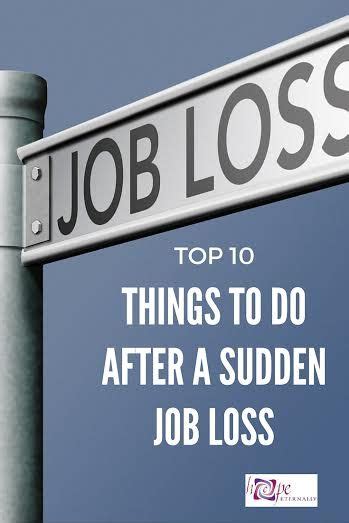Looking to Recover After Job Loss? Here Are Essential Tips

Job loss can be a challenging and emotional experience. It can leave you feeling uncertain about your future and overwhelmed by the sudden change. However, it’s important to remember that this setback is temporary and there are steps you can take to recover and move forward with your career. In this article, we will explore essential tips for recovering after job loss and finding new opportunities.
1. Allow Yourself to Grieve
Job loss can be a significant loss in your life, and it’s important to allow yourself to grieve. Give yourself permission to feel the emotions that come with this experience, whether it’s anger, sadness, or frustration. Recognize that it’s normal to go through a period of adjustment and give yourself the time and space to process your feelings.
2. Take Care of Your Emotional Well-being
In addition to allowing yourself to grieve, it’s important to take care of your emotional well-being. This can include seeking support from friends, family, or a therapist. Engaging in self-care activities such as exercise, meditation, or hobbies can also help you manage stress and maintain a positive mindset during this challenging time.
3. Assess Your Skills and Interests
Use this opportunity to reflect on your skills, interests, and values. Take the time to assess what you enjoy doing and what you’re good at. This self-reflection can help you identify potential career paths and opportunities that align with your strengths and passions.
4. Update Your Resume and Online Presence
Once you have a clear understanding of your skills and interests, update your resume and online presence to reflect your current experience and goals. Tailor your resume to highlight relevant skills and accomplishments that are transferable to your desired field. Additionally, update your LinkedIn profile and other professional networking platforms to increase your visibility to potential employers.
5. Expand Your Network
Networking is a crucial part of the job search process. Reach out to your existing network, including friends, colleagues, and former coworkers, to let them know you are actively seeking new opportunities. Attend industry events, join professional organizations, and utilize online networking platforms to expand your network and connect with individuals who can help you in your job search.
6. Research Job Opportunities
Take the time to research job opportunities in your desired field. Use online job boards, company websites, and professional networking platforms to identify potential employers and positions. Stay updated on industry trends and developments to increase your knowledge and demonstrate your enthusiasm during interviews.
7. Customize Your Job Applications
When applying for jobs, tailor your applications to each specific position. Customize your cover letter and resume to highlight how your skills and experience align with the job requirements. This personalization shows employers that you have taken the time to understand their needs and are genuinely interested in the role.
8. Prepare for Interviews
Before each interview, thoroughly research the company and prepare answers to common interview questions. Practice your responses and think of specific examples from your past experiences that demonstrate your skills and qualifications. Additionally, prepare questions to ask the interviewer to show your interest and engagement.
9. Stay Positive and Persistent
Job searching can be a lengthy process, and it’s important to stay positive and persistent. Celebrate small victories, such as getting an interview or receiving positive feedback. Stay motivated by setting goals, creating a routine, and focusing on your long-term career aspirations. Remember that rejection is a normal part of the process and use it as an opportunity to learn and grow.
10. Consider Additional Training or Education
If you’re having difficulty finding job opportunities in your desired field, consider pursuing additional training or education. This can help you gain new skills, enhance your qualifications, and increase your marketability. Explore options such as online courses, certifications, or degree programs that align with your career goals.
Conclusion
Recovering after job loss can be a challenging journey, but with the right mindset and strategies, you can move forward and find new opportunities. Give yourself time to grieve, take care of your emotional well-being, and assess your skills and interests. Update your resume and online presence, expand your network, and research job opportunities. Customize your job applications, prepare for interviews, and stay positive and persistent throughout the process. Consider additional training or education if needed. Remember, job loss is not the end of your career journey, but rather a new beginning.
Frequently Asked Questions
-
How long does it take to recover after job loss?
Recovery time after job loss can vary for each individual. It depends on factors such as the individual’s support system, financial situation, and available job opportunities. It’s important to give yourself time to grieve and heal before diving into the job search process.
-
Should I take any job that comes my way after job loss?
While it can be tempting to accept any job that comes your way after job loss, it’s important to consider your long-term career goals and aspirations. Take the time to assess whether the job aligns with your skills, interests, and values. It’s okay to be selective and wait for the right opportunity.
-
How can networking help in the job search process?
Networking is crucial in the job search process as it allows you to connect with individuals who can provide valuable insights, referrals, and job leads. By expanding your network, you increase your chances of finding hidden job opportunities and accessing the “hidden job market.”
-
Is additional training or education necessary after job loss?
Additional training or education can be beneficial after job loss, especially if you’re having difficulty finding job opportunities in your desired field. It can help you gain new skills, enhance your qualifications, and increase your marketability. However, it’s important to assess your individual situation and determine if additional training or education is necessary for your career goals.
